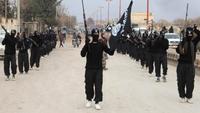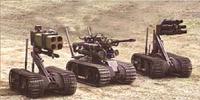-
Dogs trained on pseudo-explosives could not reliably identify genuine explosives

When it comes to teaching dogs how to sniff out explosives, there is nothing quite like the real thing to make sure they are trained right. This is the message from researchers after finding that dogs which are trained with so-called “pseudo-explosives” could not reliably sniff out real explosives (and vice versa).
-
-
Navy considering allowing sailors temporary leave before returning to active duty

The U.S. Navy is considering allowing sailors to take temporary leave and return to active duty after earning degrees or working in the private sector. The plan would save the Navy money spent on training new sailors, while retaining experienced personnel for the long term.
-
-
New deportation approach targets convicted criminals, threats to national security
Last Thursday, President Barack Obama announced the end of Secure Communitiesas part of his immigration reform strategy. The program was designed to identify deportable undocumented immigrants who had committed crimes, by allowing federal immigration agents to access fingerprint records collected at local jails. In many cases, agents requested local law enforcement officials to hold inmates beyond their jail terms until they could be transferred to federal custody. Obama has announced a new initiative — the Priority Enforcement Program— to target only undocumented immigrants who have been convicted of certain serious crimes or who pose danger to national security.
-
-
Pentagon mulls “byte for a byte” cyber retaliatory operations
Much has been made of the phrase “an eye for an eye” throughout history, and it is beginning to appear that the oft-used motto will extend to the new fields of cyber warfare as well.This “approach is something our adversaries will readily understand,” one analyst writes. “If they escalate, we escalate. They know they will lose because we have far more cyber resources to draw on than they have, and we can cause real harm if they mess with us.”
-
-
RAND study assesses threat posed by Americans joining jihadist fronts abroad
Although it is difficult to pin down the exact numbers of Western fighters slipping off to join the jihadist fronts in Syria and Iraq – the number is estimated to be around 100 — U.S. counterterrorism officials believe that those fighters pose a clear and present danger to American security. Some of these fighters will be killed in the fighting, some will choose to remain in the Middle East, but some will return, more radicalized than before and determined to continue their violent campaigns back in the United States.
-
-
GOP senators block NSA surveillance reform bill
The USA Freedom Act, a bill introduced last year aiming to curtail some of the NSA’s data collection programs, especially those focusing on U.S. phone data, failed last night to reach the 60-vote threshold required to cut off debate and move to a vote. Senator Mitch McConnell (R-Kentucky), the Republican leader, and other leading GOP senators worked hard to defeat the bill. Nearly a year-and-a-half after the Edward Snowden’s revelations, the act was considered the most politically viable effort in four decades to place curbs on NSA activities. Civil libertarians and technology companies supported the bill, as did the White House and the intelligence community – although the latter two did so more out of fear that a failure of the bill would jeopardize the extension of Section 215 of the Patriot Act, which expires next June.
-
-
ISIS has sufficient quantities of arms to carry on fighting for two years: UN

A new report prepared for the United Nations Security Council warns that Islamic State (ISIS) has in its possession sufficient reserves of small arms, ammunition, and vehicles to wage its war for Syria and Iraq for up to two years. The size and diversity the Islamist organization’s arsenal allow the group durable mobility, range, and a limited defense against low-flying aircraft. The report notes that even if the U.S.-led air campaign continues to destroy the group’s vehicles and heavier weapon systems, such a campaign “cannot mitigate the effect of the significant volume of light weapons” Isis possesses.
-
-
Transforming planes into flying aircraft carriers
Military air operations typically rely on large, manned, robust aircraft, but such missions put these expensive assets — and their pilots — at risk. While small unmanned aircraft systems (UAS) can reduce or eliminate such risks, they lack the speed, range, and endurance of larger aircraft. These complementary traits suggest potential benefits in a blended approach — one in which larger aircraft would carry, launch, and recover multiple small UAS. A flying carrier would allow the United States to use of drones in areas where the United States has no access to nearby airfields, but recovering a drone in mid-air remains a daunting technical challenge.
-
-
Right-to-carry gun laws may be inked to increase in violent crime: Stanford study
Right-to-carry or concealed-carry laws have generated much debate in the past two decades — do they make society safer or more dangerous? Prior research based on data through 1992 indicated that the laws decreased violent crime. In 2004, however, the National Research Council issued a report that found that even extending this data through 2000 revealed no credible statistical evidence these particular laws reduced crime. New Stanford research confirms that right-to-carry gun laws are linked to an increase in violent crime. “Different statistical models can yield different estimated effects, and our ability to ascertain the best model is imperfect,” the study’s lead author notes, describing this as the most surprising aspect of the study.
-
-
Wi-Fi signals enable through-wall detection
Engineers prove the concept that local Wi-Fi signals can be used to monitor moving objects and bodies that are otherwise visually obscured. Although fundamentally similar to traditional radar systems, their novel approach is entirely passive — utilizing the wireless signals that already swamp our urban airways. This technology has a wide range of applications from healthcare monitoring, security and emergency disaster relief, to finding earthquake survivors in fallen buildings.
-
-
Shooting-detection system will help police locate a shooter within a school building
For the past two years, law enforcement officials in Methuen, Massachusetts have been testing an active shooter detection system installed in a local school as part of the city’s threat detection program, which includes prevention and emergency training protocols for school staff and students. The $70,000 system includes dozens of small square panels equipped with infrared cameras and microphones. The system detects gunfire and identifies the exact location where the shooting occurred within the school building – then sends data about the incident to a command center.
-
-
New app turns smartphones into sensors for an earthquake early-warning system
The MyShake app, still in test mode, uses smartphone accelerometers and locators to augment the data on incoming quakes issued by the 400 seismometers which are part of California’s ShakeAlert program.Registered phones act as additional earthquake sensors, as the app runs an algorithm which detects when the phone is still or shaking. Should several registered phones in the same area begin to shake at the same time, an earthquake alert is issued.
-
-
Court overturns manslaughter conviction of seismologists over 2009 L'Aquila quake

An appeals court in Italy on Monday overturned manslaughter convictions of six of the seven natural disaster experts and seismologists who faced prison sentences for what a lower court described as having falsely reassured residents ahead of a 2009 earthquake which killed 309 people in the central Italy city of L’Aquila. The 2012 ruling was met with outrage and dismay by the scientific community, which argued that the convictions were based on a complete misunderstanding of the science used to calculate the probability of an earthquake. Leasing scientists warned that the case could prevent scientists from offering potentially life-saving advice on natural disasters in the future.
-
-
Autonomous weapons which select, destroy targets without human intervention proliferate

More scientists are expressing concern over autonomous weapons which are able to select and destroy targets without human control or oversight. Armed drones can be operated by remote pilots, but weapons of the future will rely more on artificial intelligence to decide what to target and whom to kill.
-
-
FBI: Lawmakers should mandate surveillance “backdoors” in apps, operating systems
FBI director James Comey said that the agency was pushing lawmakers to mandate surveillance functions in apps, operating systems, and networks, arguing that privacy and encryption prevent or disrupt some of the agency’s investigations. According to Comey, new privacy features implemented by Google and Apple in the wake of the Snowden revelations, automatically encrypt user communication and data, making it difficult for law enforcement to gather evidence and connect links among suspected criminals and terrorists.
-
More headlines
The long view
Why Was Pacific Northwest Home to So Many Serial Killers?
Ted Bundy, Gary Ridgway, George Russell, Israel Keyes, and Robert Lee Yates were serial killers who grew up in the Pacific Northwest in the shadow of smelters which spewed plumes of lead, arsenic, and cadmium into the air. As a young man, Charles Manson spent ten years at a nearby prison, where lead has seeped into the soil. The idea of a correlation between early exposure to lead and higher crime rates is not new. Fraser doesn’t explicitly support the lead-crime hypothesis, but in a nimble, haunting narrative, she argues that the connections between an unfettered pollution and violent crime warrant scrutiny.
Bookshelf: Smartphones Shape War in Hyperconnected World
The smartphone is helping to shape the conduct and representation of contemporary war. A new book argues that as an operative device, the smartphone is now “being used as a central weapon of war.”
